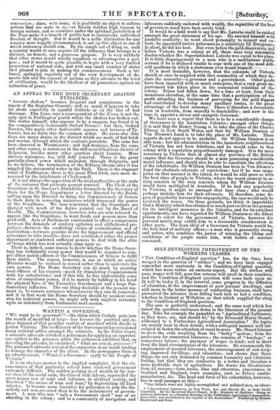AN APPEAL TO THE HOME SECRETARY AGAINST NUISANCES.
" Amain cholera" becomes frequent and conspicuous in the report of the Registrar-General ; and, as usual, it appears to take its abode especially in squalid districts or on the line of bad drainage. Elm Lane, says a correspondent of the Times, is not the only spot in Paddington parish where the cholera has broken out. The writer himself, who appears to be a surgeon, has found it in the comparatively fashionable Oxford Terrace : but then, Oxford Terrace like many other fashionable squares and terraces of Ty- burnia;has no drain into the common sewer. He avers also that there are many drains in the district which are made of bad brick and mortar, through which the contents percolate. The same has been observed in Westminster ; and bad drainage, from the same and other causes, is notorious in the still more illustrious district of Belgravia, besides many other quarters about London. More obvious nuisances, too, still defy removal. There is the great partially-closed sewer which meanders through' Belgravia, and is, we believe, the termination of the Kilburn stream after it has supplied the ornamental water in the Park. There is the stagnant canal of Paddington; there is the great Fleet ditch, once more de- nounced by the inhabitants of Clerkensvell. It is not always the opposition of the local authorities or the scale of the nuisance that prevents prompt removal. The Clerk of the Guardians in St. Saviour's BlaCkfriars forwards to the Secretary of State for the Home Department a letter directed by the Board, calling upon the Minister to bring the Commissioners of Sewers to their duty in removing nuisances which transcend the power of the Guardians. We may remember that the Guardians are charged -with much of the duties pointed out, by the Board of Health. The Commissioners, however, who are now referred to, appear, like the Guardians, to want funds and powers more than good-will. Acts of Parliament constructed to effect a compromise between the demands of sanitary agitators and oldfashioned pre- judices—between the conflicting claims of centralization and of localization—between genuine desire for improvement and official reluctance to take trouble—have not established either the proper department or conferred sufficient powers to deal with the state of things which has now actually come upon us.
There is, indeed, some reason to doubt whether the Home Secre- tary has technically every power that would be required to com- pel either parish-officers or the Commissioners of Sewers to fulfil their duties. The season, however, is one in which an active Minister would be inclined to exceed rather than to underrate his own powers. The Home -Secretary can do much by assuring local officers of his support—much by stimulating Commissioners with his exhortations ; and if this fail, he has undoubtedly some store of compulsory power, if it be merely by holding in his hand the physical force of the Executive Government and a large Par- liamentary influence. The one thing desirable at the present mo- ment is, to remove nuisances whencesoever they can be removed ; and if in that work the Home Secretary should by accident over- step his technical powers, he might rely with implicit certainty upon an indemnity from Parliament next session.


























 Previous page
Previous page